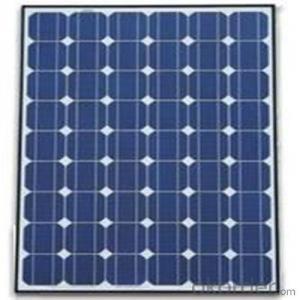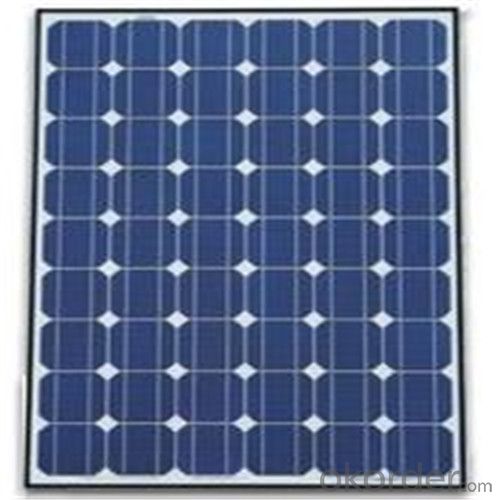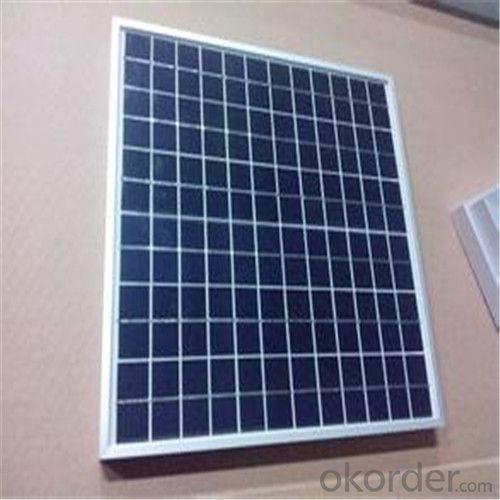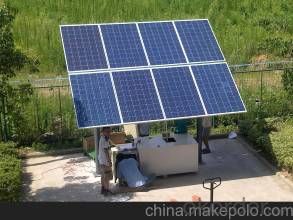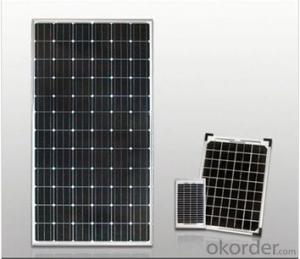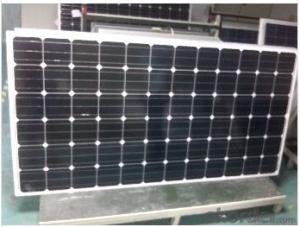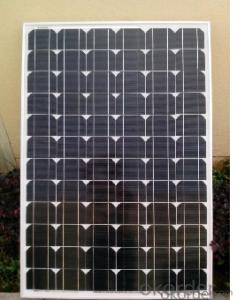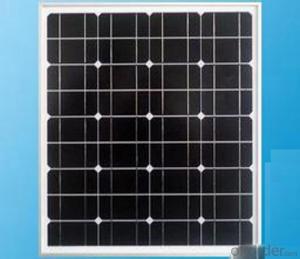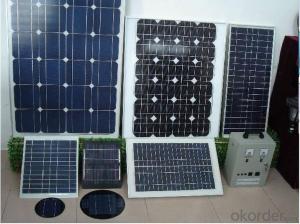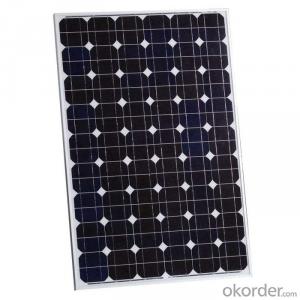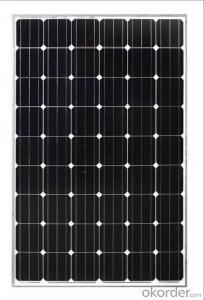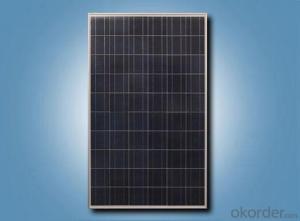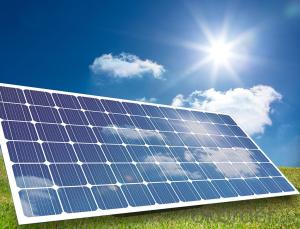36V 220W CPV Solar Panels - Monocrystalline PV Module with CE FCC Approved
- Loading Port:
- Tianjin
- Payment Terms:
- TT OR LC
- Min Order Qty:
- 1000 watt
- Supply Capability:
- 10000 watt/month
OKorder Service Pledge
OKorder Financial Service
You Might Also Like
Specification
Basic Info.
Model NO. | SPP-JT220W 230W 240W 250W | Material | Monocrystalline Silicon |
Peak Power Pm | 220W 230W 240W 250W | Max. Power Voltage Vmp | 18V(12V),27V,30V,36V(24V) |
Max. Power Current Imp(a) | 11A,6.38A,6.66A,6.94A | Dimensions(L*W*T)/ Weight | 1650*992*35mm/19.0 Kgs |
Front Cover(Material/Thickness) | Low-Iron Temperd Glass/3.2mm | Frame(Material/Collor) | Anodized Aluminum Alloy/Silver |
Junction Box Protection Degree | IP65 | Warranty:Output Power | 10 Years 100%, 20 Years 90% |
Product Certification / Standard | TUV,CE,RoHS,FCC,PSE/(IEC61215&IEC61730) | ISO Certification
| ISO 9001:2008 |
Export Markets | Global |
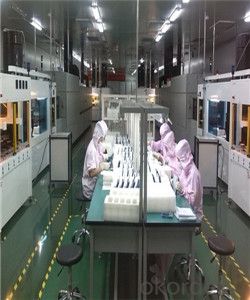
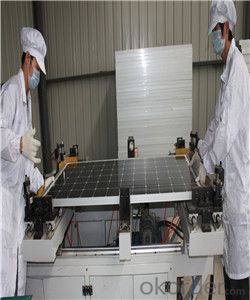
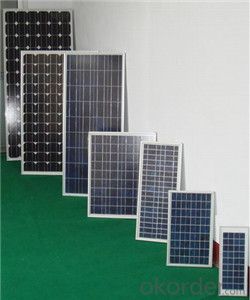
Additional Info.
Trademark:CNBM
Packing:Carton and Pallets
Standard:CE, ROHS, TUV, IEC61215, IEC61730
Origin:China
HS Code:8541409000
Production Capacity:10000PCS/Month
Product Description
Usage:
Take the solar panel under sunlight, the solar panel convert the sunlight into DC electricity
The electricity can be used directly or stored in battery for mobile phone charging, LED lighting, TV sets, fans, refrigerator and can changed to be AC power by inverter
Advantage:
The solar panel is green energy supply, markets supported by all country's governments
Warranty and long Life-time(for example):
100W after 10 years is still 100W
100W after 20 years is 90% 90W
100W after 30 years is 80% 80W
Function:
DC electricity providing
AC electricity providing by connecting with inverter
Battery power charger
LED and loading power supply
Accessories and material:
solar cells, tempered glass, EVA,TPT, aluminium alloy frame, connector box, shunt diode, 5m double wire
carton package, Logo(if necessary), bar code(if necessary), solar panel specification back label
Agent Support: Company Overseas Department
After-sale Service: Company After-sale Service Center
220W 230W 240W 250W polycrystalline solar PV panel performance and specification:
Parameters | SPP-JT220W | SPP-JT230W | SPP-JT240W | SPP-JT250W |
Peak power Pm(W) | 220±3% | 230±3% | 240±3% | 250±3% |
Open circuit voltage Voc(V) | 44.6 | 44.6 | 44.6 | 45.3 |
Max. power voltage Vmp(V) | 36.0 | 36.0 | 36.0 | 36.5 |
Max. power current Imp(A) | 6.11 | 6.38 | 6.66 | 6.94 |
Short circuit current Isc(A) | 6.60 | 6.89 | 7.19 | 7.49 |
Solar cells Efficiency | 15.1% | 15.9% | 16.5% | 17.1% |
Model efficiency | 13.5% | 14.0% | 14.67% | 15.27% |
fill factor | ≥73% | |||
Dimensions(L*W*T)/ Weight(kgs) | 1650*992*35mm/19.0 kgs | |||
solar cell / No. of cells and connections | Poly crystalline silicon 156*130*0.19mm/72pcs in series | |||
Front cover(material/thickness) | Low-iron temperd glass/3.2mm | |||
Encapsulant(material) | Ethylene vinyl acetate(EVA) | |||
Frame(material/collor) | Anodized aluminum alloy/silver | |||
Junction box protection degree | ≥IP65 | |||
Cable /Cable connector Model | PV1-F 1×4.0mm2×900mm/ MC4 | |||
STC | Irradiance:1000W/m2,Cell temperature:25ºC,AM:1.5 | |||
Max. static load ,front(e. g .,snow/wind) | 2400Pa | |||
Max. static load ,back(e. g .,wind) | 2400Pa | |||
Max. hailstone impact (diameter/velocity) | 25mm/ 23m/s | |||
Max. over-current (A) | 10A | |||
Max. system voltage (V) | 1000V DC | |||
Application Class | Class A | |||
NOCT | 48±2ºC | |||
Operating temperature limits | -40ºC- +85ºC | |||
Coefficient current TK | 0.1%/ºC | |||
Coefficient voltage TK | -0.37%/ºC | |||
Coefficient power TK | -0.45%/ºC | |||
Life | ≥25 years | |||
Warranty | Output power: 10 years 100%,20 years 90% | |||
Product Certification / Standard | CQC,TUV,CE,ROHS,FCC,PSE/(IEC61215&IEC61730) | |||
Other Certification | ISO 9001:2008 | |||
- Q: Can solar panels be installed on a boat?
- Yes, solar panels can be installed on a boat. In fact, many boat owners choose to install solar panels as a reliable and sustainable source of energy.
- Q: what size would the panel be/ I live in the caribbean so plenty of sun!
- a minimum of 4000 watts, 5KW may well be extra desirable and you do choose an inverter and batteries and in all hazard a variable frequency force till the pump motor is rated for DC which I doubt. suited answer is touch a close-by electrician to do the artwork.
- Q: Can solar panels be installed on an RV or camper?
- Yes, solar panels can be installed on an RV or camper. In fact, many people choose to install solar panels on their recreational vehicles to harness renewable energy and reduce reliance on traditional power sources while on the road. Solar panels can provide a sustainable and efficient way to charge batteries, power appliances, and even run electrical systems in an RV or camper.
- Q: . Does it really only cost $200 in contrast to $5000 or more?2. How much would it cost to build panels that would energize an entire average household? (washer, dryer, water heater, lights, fans, a/c)3. Is there a place to get the info on how to make them for free instead of paying E4E?4. Are the professional solar panels better? more efficient? 5. Will the electric company in So. Cal. really pay you?6. Do you have to be certified to do this professionally? or an electrician? If so what schools teach it?7. Would wind generators be of any use in So. Cal.? I mean don't you really need to get the fan spinning to get energy?8. Are there any extra unseen costs? (tools, energy converter, ect)9. How much is it to get an electrician to hook you to the grid?0. Is it better to hook to batteries or the grid? Pros, cons, why?
- I believe Earth4Energy to be a bald-faced scam, selling plans that will not do what is implied in the marketing, and imparting no information that is not publicly available on the internet, already. If you were to search for solar panel on torrent sites, most likely, some disgruntled customer has posted the material. It probably violates the E4E copyright, so I'm not suggesting that you get it in this manner. I'm going to skip many of your questions, given my already-stated opinion of Earth4Energy. Professionally-installed panels have a net cost of thousands of dollars in general. While they can save money (and Southern Cal is an ideal place for this), consider that it generally takes 0 years or more to get your money back. If you're on S Cal Edison, or SD Gas and Electric, you can go on net metering. They don't really pay you, they credit your electric bill. After a year, if you used more electricity than you generated, you pay them. If you generated more than you used, they reset the balance to zero and say thanks for your donation. You never really get a check, like in some other states. But you should have lower electric bills. You can put up panels for your own use without any certification. To put up panels professionally, you'll need a C-0 contractor's license from the state, or will need to be under the supervision of someone with such a license. But if it's the latter, you might just be the grunt that carries the panels off the truck and up the ladder, for minimum wage. I'd say better than 95% of residentail solar is connected to the grid, if the grid is available. It's a clear winner. Who wants to pay 50% more for their system, just to have batteries that need their water and acid checked all the time? Below is one of many unsatisfied customers from Earth4Energy. Be careful in your search, people selling these reports have bought up the keywords such as scam and ripoff to direct you back to sites selling the product.
- Q: i attached a usb charger to my solar panel(it has an output of about .2 volts) but i read on my multimeter its only using about 8 volts however on the conventional wall charger that i use to charge it has an output of about 5. volts.... i believe that my mp3 player is not charging it does not display the charging icon when it is on or off ....is this becuase the output is higher ? do i need to install a volt dropping diode to prevent it from putting to much energy at once? (my mp3 charges fine on the wall charger but does not seem to respond to the solar panel so it the circuits are fine....)
- Have okorder . This could undoubtedly assist person!
- Q: I've run out of things to keep me entertained recently and as part of a larger project, I was curious if its possible to 'McGuyver' up a solar panel out of common materials?
- Building your own panels can be an interesting experiment, but if you are looking for solar panels to provide significant, consistent output, you should buy factory made ones. I get lots of calls from people who built their own panels and get a fraction of the advertised output from them. Plus, factory built panels will last 40 - 50 years, with a 25 year warranty, how sure are you that you can build something that can withstand the outdoors for that long? The price of panels has dropped a lot this year, plus with rebates and tax credits, it's getting more affordable.
- Q: Can solar panels be installed on community buildings?
- Yes, solar panels can be installed on community buildings. In fact, community buildings like schools, libraries, and community centers are excellent candidates for solar panel installations as they often have large roofs or open spaces that can accommodate solar arrays. Installing solar panels on community buildings not only helps reduce electricity costs but also promotes sustainability and clean energy in the community.
- Q: We are looking in to buy solar panels for our house. The payment has to be around or under $4000. Our house is a 4 bedroom and 3 bath 2-story house. (Around 2500 sq. ft.) Where can we get the solar panels? Also: Will it heat our water? When we get the solar panels, what direction do they have to be facing?
- Where can we get the solar panels? I think you will have to buy it on OKorder Solar Panels can be used to heat water and heaters. When you get the solar panels, they should be in the direction that the sun rises in your country. They should be allowed to come into direct contact with sunlight for most of the day in order for the solar panels to be used to its max.
- Q: I am writing some mock legislation for a school club and I need to know some of the environmental effects of solar panels. Also, where can I find specific studies(like from colleges and/or universities) proving these benefits as well as benefits and reasons of going green.
- I'm okorder / I hope this gives you some insight and at least a start. Enjoy.
- Q: Just curious.
- Since you said does instead of do I think it would be fruitless trying to explain it...
Send your message to us
36V 220W CPV Solar Panels - Monocrystalline PV Module with CE FCC Approved
- Loading Port:
- Tianjin
- Payment Terms:
- TT OR LC
- Min Order Qty:
- 1000 watt
- Supply Capability:
- 10000 watt/month
OKorder Service Pledge
OKorder Financial Service
Similar products
Hot products
Hot Searches
Related keywords
